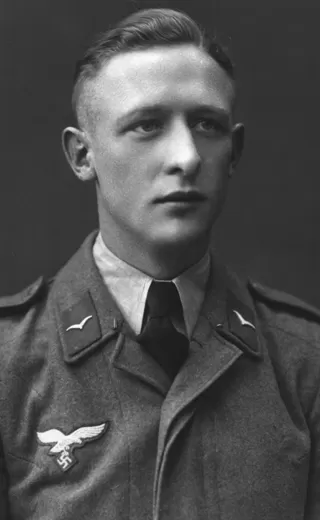Hans Albers (Actor and Singer), born on September 22, 1891 in Hamburg, Germany. Hans Albers's age 68 years (at death) & Zodiac Sign Virgo, nationality German (by birth) & Race/Ethnicity is White. Let's check, How Tall is Hans Albers?
Hans Albers Bio
Hans Albers Height
5 Feet 10 Inches (177.8 cm/1.778 m)
| Height & Weight | |
|---|---|
| Height (in Feet-Inches) | 5 Feet 10 Inches |
| Height (in Centimeters) | 177.8 cm |
| Height (in Meters) | 1.778 m |
| Weight (in Kilograms) | 67 kg |
| Weight (in Pounds) | 147.71 lbs |
Hans Albers Body Measurements
Hans Albers's full body measurements are 43 inches (109.22 cm) - 14.5 inches (36.83 cm) - 32 inches (81.28 cm).
| Body Measurements | |
|---|---|
| Measurements | 43-32-14.5 inches/ 109.22-81.28-36.83 cm |
| Chest Size | 43 inches (109.22 cm) |
| Biceps Size | 14.5 inches (36.83 cm) |
| Waist Size (Male) | 32 inches (81.28 cm) |
Hans Albers is one of the most famous Actor and Singer in whole world right now. Hans Albers was born on September 22, 1891 in Hamburg, Germany. He was born as Hans Philipp August Albers, but best known as Hans Albers.
He is the son of a butcher, and grew up in the district of St. Georg. He was seriously interested in acting by his late teens and took acting classes without the knowledge of his parents. In 1915 Albers was drafted to serve in the German Army in World War I, but was wounded early on. After his release from the Hospital in Wiesbaden where he had been treated, he performed in the local Residenztheater in comedies, antics and operettas. After the war Albers moved to Berlin, where he found work as a comedic actor in various Weimar-Era Berlin theatres. His breakthrough performance was that of a waiter in the play Verbrecher (Criminals). It was also in Berlin that Albers began a long-term relationship with half-Jewish actress Hansi Burg (1898–1975). The relationship ended only when he died in 1960.
In 1911, he began his career in films but with the start of World War I, he had to suspend his film career. In 1915, he was drafted into the German Army to serve in World War I. However, his stint as army personnel was short lived, following an injury and a severe wound which prematurely ended his military career.
After being relieved from his military duties and recovering from the major wound, he yet again pursued his ultimate passion for acting. After the end of the war, he relocated to Berlin. It was at Berlin that he found work as a comedy actor in the Weimar-Era Berlin theatres. Following a stint of roles, his breakthrough performance came with the play ‘Verbreher’, in which he played the role of a waiter.
His superlative acting ability saw him gain rapid strides. He soon received film offers and was seen acting in several notable silent films such as ‘Demetrius in A’ and ‘Rasputin’.
With over hundred silent films to his credit, he established himself as a fine actor of his time. In 1929, he created history by starring in the first ever German talkie, ‘Die Nacht gehort uns’ or ‘The Night Belongs to Us’.
Year 1930 was a significant year in his career as he played a crucial role in the film, ‘Der Greifer’, which went on to earn him immense recognition. It catapulted his star status and earned him similar roles throughout the decade. His best performance came when he was paired with a fellow German legendary actor Heinz Ruhmann. Together the duo starred in various films such as ‘Bomben auf Monte Carlo’ and ‘Der Mann, der Sherlock Holmes war’. Interestingly, the songs of his films became popular chartbusters and are hummed by people till date.
The 1930s witnessed the rise of the Nazi party as well. Though he was a Nazi party member, he did not publicly state his stand and instead remained at distance from government proceedings. However, it was during the Nazi rule that he became the most popular actor of his time. Year 1943 witnessed him star in Ufa’s big-budget anniversary picture ‘M�nchhausen’ and the classic German film ‘Gro�e Freiheit Nr. 7’. Interestingly, despite being a Nazi follower, he did not endorse the same in his films.
The 1950s was marred by his addiction to alcohol. Though he starred in several movies of the decade, none impacted his career in a big way. His artistic prowess and creative ingenuity also seemed to have lost its charm. However, this did not deter him from acting, which he continued almost till the end of his life.
He met and fell in love with a Jewish actress, Hansi Burg. Despite being a tumultuous affair, the two stayed loyal to each other until the very end. Following Nazi’s emergence to power in 1933, he along with his girlfriend Hansi Burg moved to Starnberger See in Bavaria. Though the Nazi government initially accepted the relationship, too much of pressure finally led Burg to relocate to Switzerland and later to Great Britain in 1939. After the end of World War II, she finally returned to Germany to be with him for the rest of his life. The two remained a couple until his death in 1960.
He collapsed during a theater performance with massive internal bleeding and died three months later on 24 July 1960 at a sanatorium in Kempfenhausen near Lake Starnberg at the age of 68. He was cremated and subsequently buried at the Ohlsdorf Cemetery in Hamburg, the city of his birth. He ranked in the list of most popular German actor and singer.
Read Full Biography Wikipedia